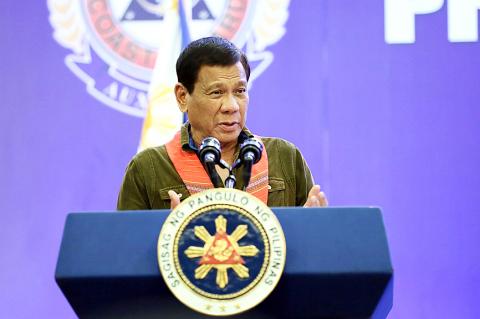Philippine President Rodrigo Duterte said China threatened to go to war after he asserted the Southeast Asian nation’s sovereignty over disputed territory.
In an unspecified meeting with Chinese President Xi Jinping (習近平), Duterte said he would drill for oil in the South China Sea, citing an international arbitration tribunal ruling upholding the Philippines’ claim.
That prompted a retort from Xi, Duterte said.

Photo: AFP
“Well, if you force this, we’ll be forced to tell you the truth. We will go to war. We will fight you,” Duterte on Friday quoted Xi as saying.
Duterte did not say when and where the conversation took place.
Calls and an e-mail seeking comment from the Chinese Ministry of Foreign Affairs outside of regular office hours were not immediately answered.
Since Duterte took office in June last year, the tough-talking 72-year-old leader had repaired fractured ties with China, touting the economic benefits including US$24 billion of loans and investment.
China’s efforts to assert its dominance over the South China Sea, where more than US$5 trillion in annual trade is ferried, have in the past angered Southeast Asian nations with competing claims, such as Vietnam and the Philippines.
The Philippines won a ruling by the Permanent Court of Arbitration in The Hague, Netherlands, in last July last year that rejected China’s assertion to the territory.
China has said the tribunal has no jurisdiction over sovereignty disputes.
China’s claim is “far away,” Duterte said in the southern Philippine city of Davao, recalling what he told Xi.
“It’s almost alien to us to hear those words because we were never under Chinese jurisdiction,” he said.
Separately, officials from the two countries agreed to discuss “mutually acceptable approaches” to South China Sea issues during a bilateral consultation in the Chinese city of Guiyang on Friday, according to a joint statement released by the Philippine Department of Foreign Affairs.
Handling incidents and disputes in an appropriate manner is important, they said.
The next discussion is to be held in the Philippines in the second half of the year.

SECURITY: As China is ‘reshaping’ Hong Kong’s population, Taiwan must raise the eligibility threshold for applications from Hong Kongers, Chiu Chui-cheng said When Hong Kong and Macau citizens apply for residency in Taiwan, it would be under a new category that includes a “national security observation period,” Mainland Affairs Council (MAC) Minister Chiu Chui-cheng (邱垂正) said yesterday. President William Lai (賴清德) on March 13 announced 17 strategies to counter China’s aggression toward Taiwan, including incorporating national security considerations into the review process for residency applications from Hong Kong and Macau citizens. The situation in Hong Kong is constantly changing, Chiu said to media yesterday on the sidelines of the Taipei Technology Run hosted by the Taipei Neihu Technology Park Development Association. With

A US Marine Corps regiment equipped with Naval Strike Missiles (NSM) is set to participate in the upcoming Balikatan 25 exercise in the Luzon Strait, marking the system’s first-ever deployment in the Philippines. US and Philippine officials have separately confirmed that the Navy Marine Expeditionary Ship Interdiction System (NMESIS) — the mobile launch platform for the Naval Strike Missile — would take part in the joint exercise. The missiles are being deployed to “a strategic first island chain chokepoint” in the waters between Taiwan proper and the Philippines, US-based Naval News reported. “The Luzon Strait and Bashi Channel represent a critical access

‘FORM OF PROTEST’: The German Institute Taipei said it was ‘shocked’ to see Nazi symbolism used in connection with political aims as it condemned the incident Sung Chien-liang (宋建樑), who led efforts to recall Democratic Progressive Party (DPP) Legislator Lee Kun-cheng (李坤城), was released on bail of NT$80,000 yesterday amid an outcry over a Nazi armband he wore to questioning the night before. Sung arrived at the New Taipei City District Prosecutors’ Office for questioning in a recall petition forgery case on Tuesday night wearing a red armband bearing a swastika, carrying a copy of Adolf Hitler’s Mein Kampf and giving a Nazi salute. Sung left the building at 1:15am without the armband and apparently covering the book with a coat. This is a serious international scandal and Chinese

COUNTERINTELLIGENCE TRAINING: The ministry said 87.5 percent of the apprehended Chinese agents were reported by service members they tried to lure into becoming spies Taiwanese organized crime, illegal money lenders, temples and civic groups are complicit in Beijing’s infiltration of the armed forces, the Ministry of National Defense (MND) said in a report yesterday. Retired service members who had been turned to Beijing’s cause mainly relied on those channels to infiltrate the Taiwanese military, according to the report to be submitted to lawmakers ahead of tomorrow’s hearing on Chinese espionage in the military. Chinese intelligence typically used blackmail, Internet-based communications, bribery or debts to loan sharks to leverage active service personnel to do its bidding, it said. China’s main goals are to collect intelligence, and develop a